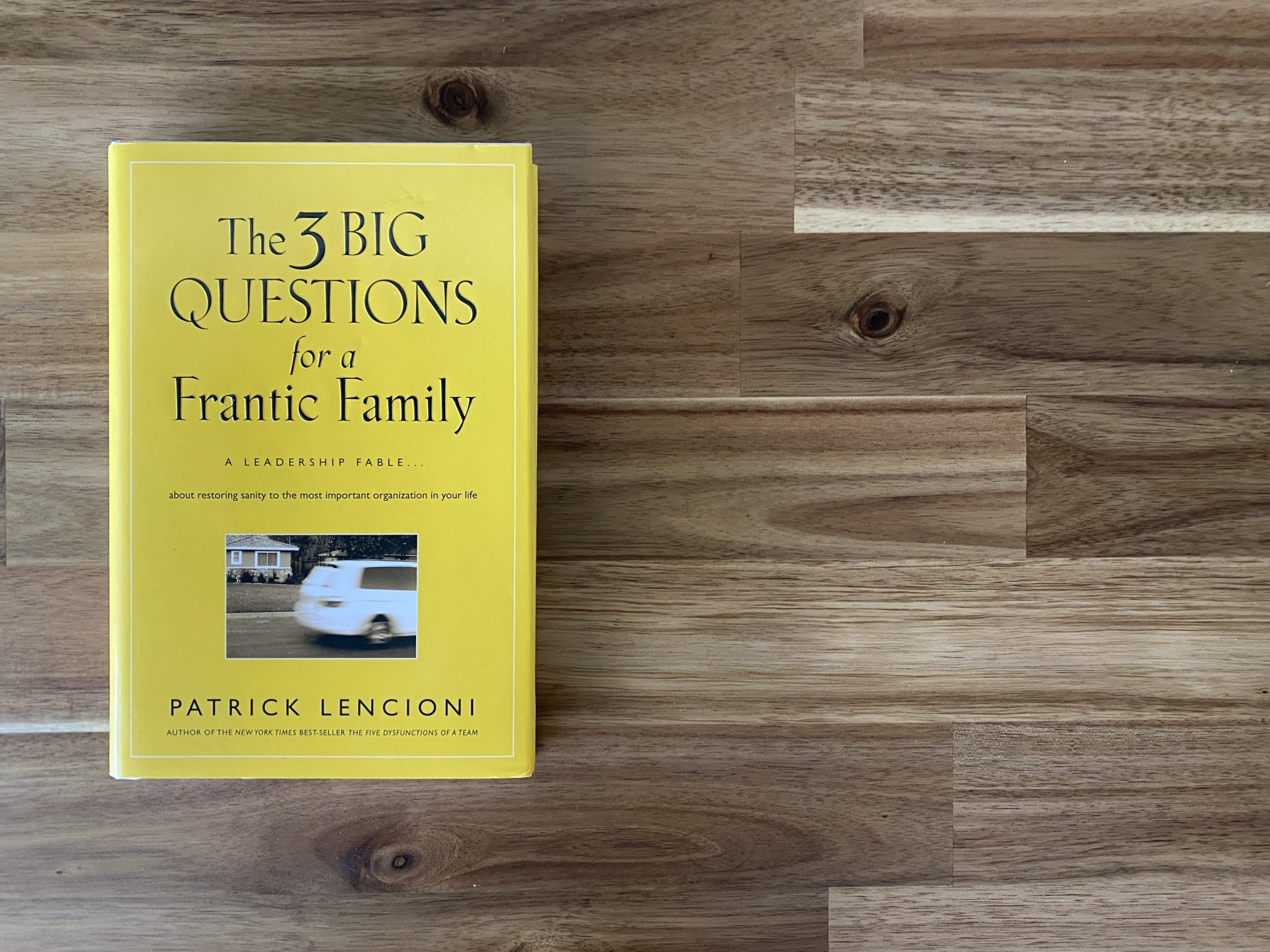
Author: Patrick Lencioni
Theresa Cousins had never been so mad at her husband. Ironically, the comment that sparked her anger wasn’t really directed at her specifically, and certainly wasn’t meant as a criticism. In fact, he said it without malice or emotion.
“If my clients ran their companies the way we run this family, they’d be out of business.”
In this unique and groundbreaking book, business consultant and New York Times best-selling author Patrick Lencioni turns his sights on the most important organization in our lives – the family. As a husband and the father of four young boys, Lencioni realized the discrepancy between the time and energy his clients put into running their organizations and the reactive way most people run their personal lives. Having experienced the stress of a franctic family firsthand, he and his wife began applying some of the tools he uses with Fortune 500 companies at home, and with surprising results.
Like Lencioni’s other books, The Three Big Questions for a Frantinc Family is written as a fable, using realistic and humorous characters and plot lines that will keep readers turning pages with anticipation while they’re learning how to bring sanity to their lives. And they’ll be amazed how just a little bit of structure and a few minutes of follow-through each week can make the difference between drudgery and fulfillment at home.
Part One: The Problem – This fable begins by introducing us to Jude and Theresa Cousins, overwhelmed parents of four. Jude, a business consultant puts his foot in his mouth one day when he says, “If my clients ran their companies the way we run this family, they’d be out of business.” Although the statement stung, it caused Theresa to do a little research, discovering that every other parent she knew, even the ones with the best behaved kids and most put together houses, also experienced the overwhelming chaos every single day. The “frantic family” seemed to be every family.
Part Two: Business School – While Jude is out of town on a business trip, Theresa has lunch with Rob, his business partner at the consulting office. Theresa wanted to learn how Jude’s company helped businesses run their companies. She wanted to know exactly what made organizations successful and how that might apply to a family. Rob lectured on the importance of core purpose, core values, organizational strategies, goals, and even the organizational rally cry. Theresa took copious notes and would spend the next several days translating these ideas to the “family organization” she helped lead. Jude returned and helped her clarify these components as they began to create a plan for their family.
Part Three: Trial and Error – With Jude’s help, Theresa put together a plan that would definitely help their family become less frantic. In her excitement, she shared her plan with several friends. She expected that her friends would be as excited and she was frustrated when a few weeks went by and no one reached out to tell her how life-changing their meeting had been. Theresa discovered that the plan was too complicated, the same reason why Theresa and Jude weren’t making as much progress on their plan either. After more work, Theresa simplified the entire process. Realizing that families aren’t businesses, the approach could be a little simpler, more family friendly. The end result was a family plan that could be created by answering three simple questions.
Question #1: What Makes Your Family Unique? If you don’t know what differentiates your family from others, you won’t have a basis for making decisions, and you’ll try to be all things to all people.
Question #2: What is Your Family’s Top Priority – Rallying Cry – Right Now? You need to know what the single most important objective is for your family over the next two to six months. Without a top priority, everything becomes important and you end up reacting to whatever issues seem urgent that day.
Question #3: How Do You Talk About and Use the Answers to These Questions? If you answer the first two questions but don’t use those answers in daily, weekly, and monthly decision-making, it will yield no benefits.
Yes, life should be busy and demanding at times, but it should also be lived with a sense of purpose and sanity that allows us to be the people we’re meant to be.
In fact, most of us already know what it takes to make our families more effective and sane; we just have this tendency, when faced with a little stress, to forget. As the eighteenth-century author Samuel Johnson once said, “People need to be reminded more often than they need to be instructed.”
When something is part of a bigger goal that I know we’re going to be talking about every week, it’s harder for me to let it get pushed aside by those pesky, tactical, and artificially urgent things that distract us from what really matters. Now I can let some things go that I would have felt guilty about ignoring in the past when everything was equally important.